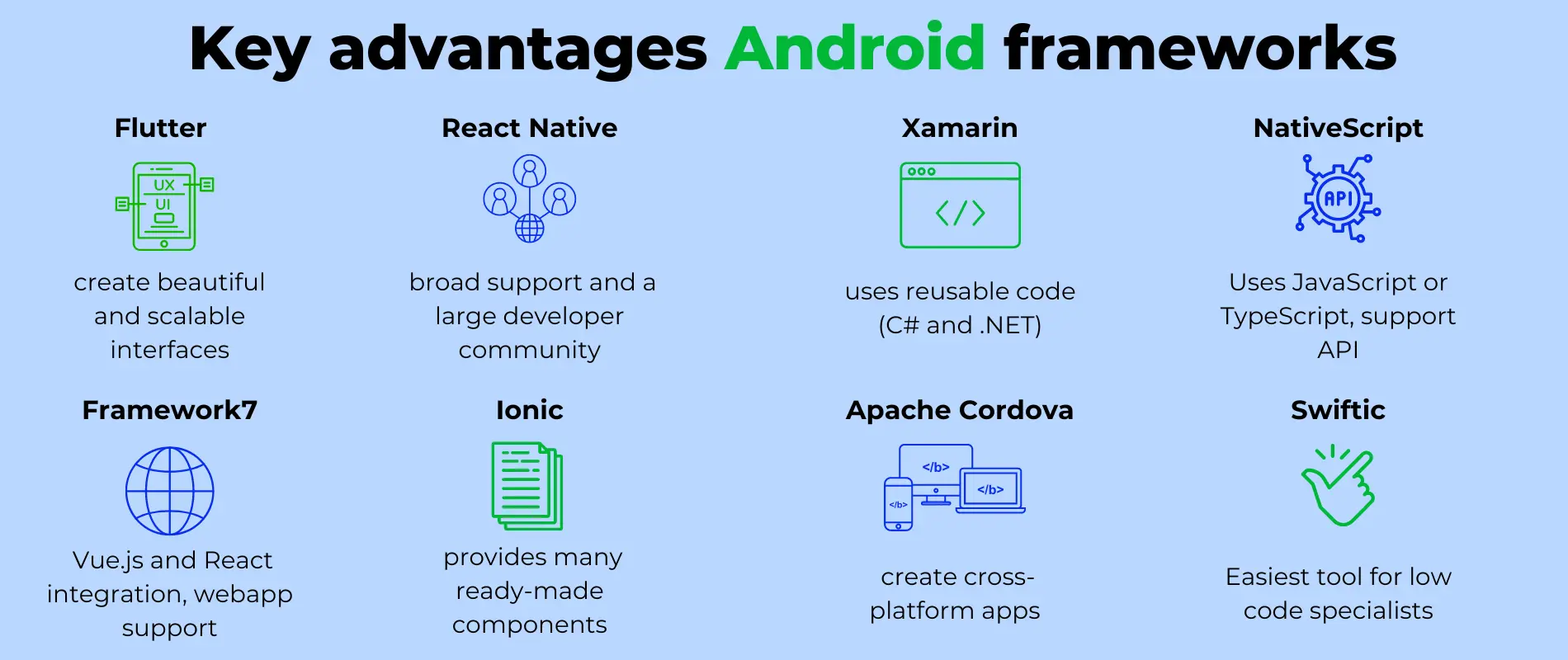Best Android Frameworks for App Development


Every year, mobile apps become an integral part of our daily lives. The development of applications for the Android platform from developers requires not only a profound understanding of programming languages, but also the ability to effectively use frameworks. In this article, we will look at what an app development framework is, and what criteria should be considered when choosing the best development tool. We also look at several popular Android browsers, from Flutter, React to Cordova and Swiftic.
An app development framework is a set of tools, libraries, and components designed to simplify the software creation process. It provides developers with ready-made solutions for common tasks, allowing them to focus on more creative and unique aspects of development. This is a kind of skeleton that provides developers with a solid framework, a certain structure and clear rules for interaction between application components. The framework provides not only basic functionality, but also a unified approach to solving typical tasks, which helps reduce development time and ensures more effective project management.
Thus, the framework not only simplifies the technical aspects of development, but also serves as a catalyst for innovation, allowing developers to focus on the creative side of the process. A structured approach framework for Android app development contributes to the consistency, reliability, and scalability of the application. As a result, the framework becomes not just a development tool, but a solution that opens up new horizons for innovation in the world of programming.
Choosing the right framework affects the success of the project. There are several criteria to consider when choosing an Android framework:
Android frameworks provide developers with many advantages that have made them an integral part of the process of creating mobile applications. The key aspect is the ability to develop cross-platform applications. This means that developers can use the same code for applications designed for different operating systems, which greatly simplifies and speeds up development.
Additionally, Android frameworks provide effective management of various tasks and support the adaptability of applications for various devices and screen resolutions. This guarantees high performance and satisfaction of user needs.
One of the advantages is also the ability to carefully customize the user interface. Flexible styling tools and a wealth of widgets make application design intuitive and attractive.
The existence of an extensive developer community, active support and access to valuable resources contribute to quick problem-solving and continuous skill development. Extensive documentation and training materials facilitate effective training of newcomers and their integration into the team.
The convenience of integration with external services is especially important. Android SDK framework provide convenient tools for implementing various third-party services, which expands the functionality of applications and increases their value to users.
Finally, the rich range of functionality and API provides developers with many tools to implement a variety of features in their applications. All these aspects make Android frameworks an indispensable tool for creating modern, feature-rich and attractive mobile applications.
The Android UI Framework is a fundamental tool for mobile application developers, it provides powerful tools for creating an intuitive and attractive user interface. Structured around XML markup, the framework offers various widgets and components that allow designers and developers to easily organize and visualize interface elements. Flexibility in customizing the appearance of the application is achieved through the use of themes and styles. This allows you to achieve uniformity and visual consistency. From animation support to efficient input event management, the Android UI Framework provides a full range of capabilities for creating modern and innovative user interfaces. Thanks to this framework, developers can easily adapt their applications to different devices, while providing high-quality visual interaction and increased end-user satisfaction.

Flutter, developed by Google, uses the Dart programming language. Its main advantage is the ability to create beautiful and high-performance interfaces. However, additional work may be required to fully integrate with device functions.
React Native, supported by Facebook, allows you to use JavaScript to create cross-platform applications. Its advantage is broad support and a large developer community, which ensures relevance and support.
Xamarin, acquired by Microsoft, uses C# and .NET, which makes it attractive to developers familiar with these technologies. It provides a high degree of reusable code, which speeds up development.
NativeScript uses JavaScript or TypeScript and allows you to create applications with a native interface for Android. It provides access to the device API, which provides full control over the functionality.
Framework7 is an HTML framework for creating mobile applications based on web technologies. As a lightweight and easy-to-learn tool, Framework7 provides developers with the ability to create applications with beautiful designs and smooth animations. Its integration with Vue.js and React make it a convenient choice for developers familiar with these frameworks.
Ionic, also based on web technologies, uses HTML, CSS, and JavaScript. It provides many ready-made components, which speeds up the development process. Using Angular, Ionic provides high performance and the ability to create cross-platform applications compatible with various operating systems.
Apache Cordova provides the ability to use web technologies to create mobile applications. It supports a variety of platforms, including Android, making it a flexible choice for developers looking to create cross-platform applications with minimal code changes.
Swiftic is a tool that allows you to create mobile applications without the need for profound programming knowledge. Using ready-made templates and an intuitive interface, Swiftic simplifies the process of creating applications, especially for those who are just starting their way into the development world.
Flutter, despite its effectiveness in creating colourful and high-performance interfaces, sometimes faces limitations in using third-party libraries, which can make it difficult to integrate certain functionality. React Native, although it provides cross-platform development, sometimes experiences delays in updating to new versions of operating systems, which may reduce support for the latest features. Xamarin, although it allows you to use C# for development, may have a more limited community and fewer ready-made components compared to some competitors. NativeScript may require additional efforts to ensure consistency in design across platforms. Framework7, despite its lightness, may limit flexibility in certain development scenarios. Ionic, which uses web technologies, may face performance limitations when creating more complex applications. Apache Cordova, although it provides broad platform support, may sometimes encounter performance issues on some devices. Swiftic, while offering ease of use, can limit flexibility and complexity in creating highly integrated functional applications.
The choice of framework depends on many factors, including the needs of the project, the experience of the development team and the desired characteristics of the application. It is important to carefully evaluate each framework, considering the specific requirements and goals of the project.
Regardless of the chosen framework, it is important to remember that successful Android app development software requires not only technical competence, but also an understanding of user needs. If you are looking to create a cross-platform application with high-performance and stylish design, Flutter may be an excellent choice. For developers who prefer to use familiar JavaScript, React Native is an attractive option. It provides high performance as well as broad support from the developer community. Xamarin, in turn, provides the ability to use the C# programming language and integrate with the platform.NET, which makes it an ideal choice for developers familiar with these technologies.
If you require full control over device functions and API access, then NativeScript may be the best solution. It allows you to create applications with a native interface using JavaScript or TypeScript.
Each of the frameworks considered has its strengths and weaknesses, and the choice depends on the specific needs of the project. Our development team is ready to support you at every stage of application creation, from analysing requirements and choosing the right framework, to development, testing, and implementation.
PNN Soft strives to ensure that every customer receives a unique and high-quality application capable of competing in the mobile application market. Our developers follow the latest trends in mobile development and are ready to translate your ideas into innovative high-level applications.
If you have any ideas for the development of mobile or cross-platform applications, please contact us. We provide high-quality project execution, individual approach and support at all stages of development.